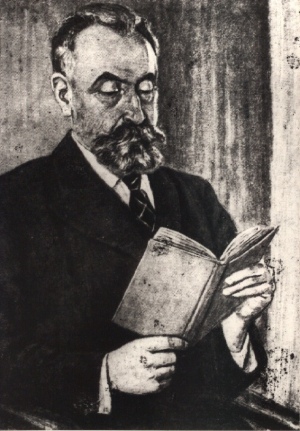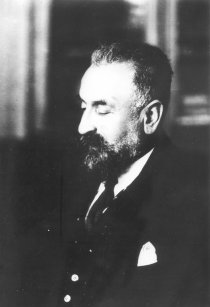<Back to Index>
- Sociologist Marcel Mauss, 1872
- Novelist Benito Pérez Galdós, 1843
- Prime Minister of Norway Einar Henry Gerhardsen, 1897
PAGE SPONSOR


Marcel Mauss (10 May 1872 – 1 February 1950) was a French sociologist. The nephew of Émile Durkheim, Mauss' academic work traversed the boundaries between sociology and anthropology. Today, he is perhaps better recognised for his influence on the latter discipline; particularly with respect to his analyses of topics such as magic, sacrifice and gift exchange in different cultures around the world. Mauss had a profound influence upon the founder of structural anthropology, Claude Lévi - Strauss. His most famous book is The Gift (1923}.
Mauss was born in Épinal, Vosges, to a Jewish family, and studied philosophy at Bordeaux, where his uncle Émile Durkheim was teaching at the time, and aggregated in 1893. Instead of taking the usual route of teaching at a lycée, however, Mauss moved to Paris and took up the study of comparative religion and the Sanskrit language. His first publication in 1896 marked the beginning of a prolific career that would produce several landmarks in the sociological literature.
Like many members of Année Sociologique Mauss was attracted to socialism, particularly that espoused by Jean Jaurès. He was particularly active in the events of the Dreyfus affair and towards the end of the century he helped edit such left wing papers as le Populaire, l'Humanité and le Mouvement Socialiste, the last in collaboration with Georges Sorel.
Mauss took up a chair in the 'history of religion and uncivilized peoples' at the Ecole Pratique des Hautes Etudes in 1901. It was at this time that he began drawing more and more on ethnography, and his work began increasingly to look like what we would today call anthropology.
The years of World War I were
absolutely devastating for Mauss. Many of his friends and colleagues
died in the war, and Durkheim died shortly before its end. The postwar
years were also difficult politically for Mauss. Durkheim had made
changes to school curricula across France, and after his death a
backlash against his students began. Like many other followers of
Durkheim, Mauss took refuge in administration, securing Durkheim's
legacy by founding institutions such as l'Institut Français de Sociologie (1924) andl'Institut d'Ethnologie in 1926. In 1931 he took up the chair of Sociology at the Collège de France. He actively fought against anti - semitism and racial politics both before and after World War II. He died in 1950. In his classic work The Gift,
Mauss argued that gifts are never "free". Rather, human history is full
of examples that gifts give rise to reciprocal exchange. The famous
question that drove his inquiry into the anthropology of the gift was:
"What power resides in the object given that causes its recipient to
pay it back?". The answer is simple: the gift is a "total
prestation", imbued with "spiritual mechanisms", engaging the honour of
both giver and receiver (the term "total prestation" or "total social fact" (fait social total) was coined by his student Maurice Leenhardt after Durkheim's social fact).
Such transactions transcend the divisions between the spiritual and the
material in a way that according to Mauss is almost "magical". The
giver does not merely give an object but also part of himself, for the
object is indissolubly tied to the giver: "the objects are never
completely separated from the men who exchange them". Because
of this bond between giver and gift, the act of giving creates a social
bond with an obligation to reciprocate on part of the recipient. To not
reciprocate means to lose honour and status, but the spiritual
implications can be even worse: in Polynesia, failure to reciprocate means to lose mana,
one's spiritual source of authority and wealth. Mauss distinguished
between three obligations: giving - the necessary initial step for the
creation and maintenance of social relationships; receiving, for to
refuse to receive is to reject the social bond; and reciprocating in
order to demonstrate one's own liberality, honour and wealth. An
important notion in Mauss' conceptualisation of gift exchange is what
Gregory (1982, 1997) refers to as "inalienability". In a commodity
economy there is a strong distinction between objects and persons
through the notion of private property. Objects are sold, meaning that
the ownership rights are fully transferred to the new owner. The object
has thereby become "alienated"
from its original owner. In a gift economy, however, the objects that
are given are inalienated from the givers; they are "loaned rather than
sold and ceded". It is the fact that the identity of the giver is
invariably bound up with the object given that causes the gift to have
a power which compels the recipient to reciprocate. Because gifts are
inalienable they must be returned; the act of giving creates a
gift - debt that has to be repaid. Because of this, the notion of an
expected return of the gift creates a relationship over time between
two individuals. In other words, through gift - giving a social bond
evolves that is assumed to continue through space and time until the
future moment of exchange. Gift exchange therefore leads to a mutual
interdependence between giver and receiver. According to Mauss, the
"free" gift that is not returned is a contradiction because it cannot
create social ties. Following the Durkheimian quest for understanding
social cohesion through the concept of solidarity, Mauss's argument is that solidarity is achieved through the social bonds created by gift exchange. Mauss's
views on the nature of gift exchange have not been without their
critics. Testart for example argues that there are "free" gifts, such
as passers - by giving money to beggars in e.g. a large Western
city. Donor and receiver do not know each other and are unlikely to
ever meet again. In this context, the donation certainly creates no
obligation on the side of the beggar to reciprocate; neither the donor
nor the beggar have such an expectation. Moreover, the transaction does
not establish a relationship between the two, much less a mutual
interdependence . Testart also suggests that there are different kinds
of obligations: a) feelings of obligation, e.g. created by having been
invited for dinner and having a feeling that one should reciprocate; b)
social obligations, meaning that the social context obliges one to
reciprocate, and that a failure to do so would not only affect one's
relationship with the giver but also affect one's reputation in
general; and c) legal obligations, as established through a legal
contract. Testart argues that only the latter can actually be enforced.
He feels that Mauss overstated the magnitude of the obligation created
by social pressures, particularly in his description of the potlatch amongst North American Indians. Another example of a non - reciprocal "free" gift is provided by James Laidlaw. He describes the social context of Indian Jain renouncers, a group of itinerant celibate renouncers living an ascetic life of
spiritual purification and salvation. The principle of non - violence
influences the diet of Jain renouncers and compels them to avoid
preparing food as this could potentially involve violence against
microscopic organisms. Since Jain renouncers do not work, they rely on
food donations from lay families within the Jain community. However,
the former must not appear to be having any wants or desires, and only
very hesitantly and apologetically receive the food prepared by the
latter. Laidlaw describes how the renouncers produce litanies of
refusal when receiving the food and never show thankfulness or
appreciation for it. In order not to appear as beggars, they visit
families at random, attempting not to create relationships with a
family by returning there regularly. What is given is not considered a
gift by either donors or receivers, and since appearing as having any
wants would spoil the Jain renouncer's spiritual purity there
absolutely must not be anything given in return. Consequently, what
Jain renouncers receive is supposed to be a spontaneous free gift
without any strings attached, and the elaborate culturally constructed
process surrounding this procedure is meant to ensure that this is what
happens. In his argumentation, Laidlaw employs Derrida's four criteria for a "free gift": Laidlaw
unsuccessfully argues that food donations received by Jain renouncers
fulfil all four criteria. They are a non - reciprocated free gift,
although they aren't a very altruistic one since such donations are the
"paradigmatic religious good deed" (punya). Yet "Punya" literally means "merit, religious merit; virtue; or charity" and the
local lay families are very eager to receive these moral "gifts" in
return for their material gifts. Laidlaw's
example does pose a challenge to Mauss's definition of the gift in two
ways: first, it is given with only moral non - material gifts received;
second, these moral returns are impermanent, except in the memory and
stories of the recipients. for example, cooking a delicious
Thanksgiving dinner for the family certainly creates obligations, but
object (the dinner) given is necessarily consumed in the process. There
only remains the memory of the object, and it becomes questionable how
there remains an "indissoluble bond of a thing with its original owner". Similarly, money given to beggars in a context
where giver and receiver are aliens (as in Testart's example) appears
to be fully alienated from the former, particularly since money - in
contrast to other objects - often (albeit not always) has no inherent
personal qualities. Yet somehow the gaze of the giver and receiver may
remain in memory, or the circumstances of the gifting may remain and be
told to others during stories. "Free"
gifts therefore challenge the aspects of the Maussian notion of the
gift unless we take into consideration the moral and non - material
qualities of gifting. These aspects are, of course, at the heart of the
gift, as demonstrated in books such as Annette Weiner's Inalienable Possessions: The Paradox of Keeping While Giving. While Mauss is known for several of his own works - most notably his masterpiece Essai sur le Don ('The Gift') - much of his best work was done in collaboration with members of the Annee Sociologique, including Durkheim (Primitive Classification), Henri Hubert (Outline of a General Theory of Magic and Essay on the Nature and Function of Sacrifice), Paul Fauconnet (Sociology) and others. Like
many prominent French academics, Mauss did not train a great number of
students. Nonetheless, many anthropologists claim to have followed in
his footsteps, most notably Claude Lévi - Strauss. The essay on The Gift is the origin for anthropological studies of reciprocity. His analysis of the Potlatch has inspired Georges Bataille (The Accursed Share); then the situationists (the name of the first situationist journal was "Potlatch"); and has been used by many interested in gift economies and Open Source software, although this latter use sometimes differs from Mauss's original formulation.